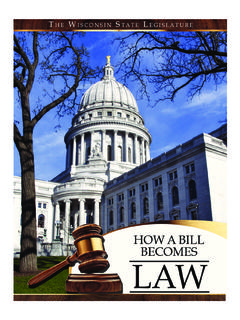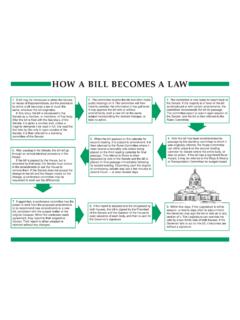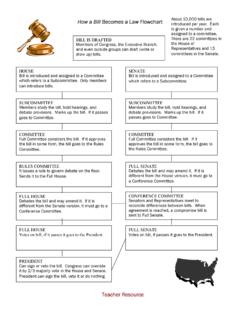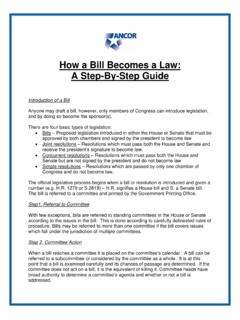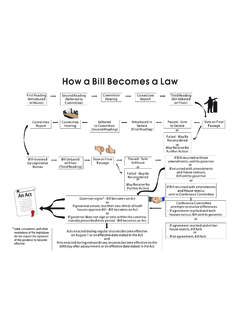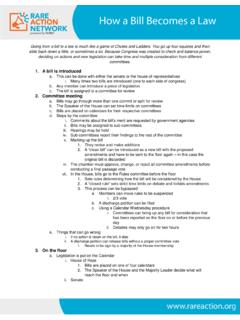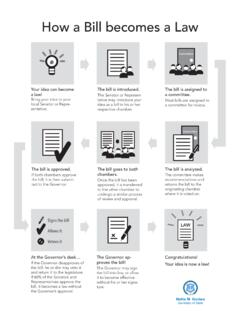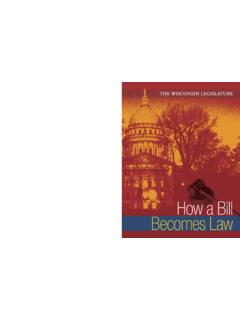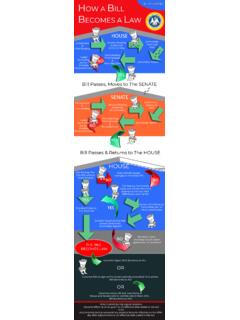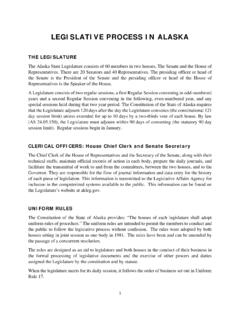Transcription of How a Bill Becomes Law - The New Mexico EDGE
1 1 How a bill Becomes Law Introduction As enactment of House bill 366 in the 2001 legislative session that placed a three percent residential valuation limit increase illustrates, actions of the New Mexico Legislature can have very immediate and significant impacts on how assessor s offices function. It is therefore important that assessors understand how the legislative processes works and how they can influence the course of proposed legislation. This chapter therefore describes how laws are enacted in New Mexico , how assessors and others can understand what proposed legislation is likely to do, and how assessors may affect legislation via effective testimony before legislative committees.
2 The Legislature .. bicameral institutions first arose in medieval Europe where they were associated with separate representation of different estates of the realm. For example, one house would represent the aristocracy, and the other would represent the commoners. As required by the New Mexico Constitution (Article IV, Section 3 shown in Exhibit 1 below) the New Mexico Legislature is bicameral , based on two legislative chambers, and is composed of 112 members -- 42 in the Senate and 70 in the House of Representatives. Since approximately 2 million people live in New Mexico , each representative serves approximately 47,600 citizens (2 million 42) and each senator represents approximately 28,600 New Mexicans.
3 Senators serve two-year terms. Representatives serve for four years (Article IV, Section 4). Unlike county officials, no term limits apply to members of the New Mexico Legislature. Legislators are paid per diem during the legislative session based on payments approved by the Internal Revenue Service (Article IV, Section 10). Democrats tend to dominate the New Mexico Legislature. By the end of January, 2011, 24 senators, or roughly 64 percent were Democrats, while the remaining 15 (36 percent) were Republicans. Democrats also comprised a majority of members of the House of Representatives, although their margin was not as great in the Senate.
4 36 of the representatives were Democrats, while 33 were Republicans. One seat was vacant. The Legislature meets in regular session on the second Tuesday in January of each year. The New Mexico Constitution limits the regular session to 60 calendar days in odd-numbered years the long session, and 30 days in even-numbered years the short session (Article V, Section 5). Issues considered during the short session are constitutionally restricted to fiscal matters, special issues designated by the Governor and bills that past in the previous year s Legislature, but were vetoed by the governor in the previous year. Contents (page) Introduction (1) The Legislature (1) How a bill is passed (5) Numbers of Bills Introduced and Enacted in Recent Years (6) How to Find and Follow a bill (7) How Read a bill (8) Fiscal Impact Reports.
5 An Easy Path to Understand What a bill Does (10) How to Testimony before a Legislative Committees (16) Appendix (17) 2 The Lieutenant Governor is elected statewide separately from the governor and presides over the Senate , the presiding officer, while the Speaker of the House is elected from the House by Representatives in a closed door majority member caucus and is the presiding officer in the House. The President of the Senate is the presiding officer of the Senate when the lieutenant governor is absent (Article 5, Section 8). The Governor and Lieutenant Governor are provided with the power in to assign members to committee within the chambers over which they preside.
6 This power conveys considerable influence on the legislation that emerges from any particular legislative session. The Governor may call the legislature into special sessions (Article IV, Section 6 of the Constitution). The legislature may call itself into special session under some circumstances. The Constitution imposes no limit on how long a special sessions last. During sessions called by the Governor, lawmakers may consider only issues chosen by the Governor and listed in the Governor s "call," or proclamation that convenes a special session. The Governor may, however, require the legislature to consider other issue after the session begins.
7 Bills passed by the legislature must be submitted to the Governor for approval prior to becoming law. If the Governor signs a bill it Becomes law. If the Governor vetoes it, the Legislature may override it via a two-thirds majority vote. Bills approved passed by the Legislature takes effect 90 days after its passage unless two-thirds of each house votes to give the bill either immediate effect or earlier effect. The Legislature may provide for an effective date ( , when the bill s provisions are enforced) that is before or after the 90th day. _____ Exhibit 1: New Mexico Constitution, Article IV, Section 1-6, 8, 10, 22 and 23 Source: NM Compilation Commission, Section 1.
8 [Vesting of legislative power; location of sessions; referendum on legislation.] The legislative power shall be vested in a senate and house of representatives which shall be designated the Legislature of the state of New Mexico , and shall hold its sessions at the seat of government. The people reserve the power to disapprove, suspend and annul any law enacted by the Legislature, except general appropriation laws; laws providing for the preservation of the public peace, health or safety; for the payment of the public debt or interest thereon, or the creation or funding of the same, except as in this constitution otherwise provided; for the maintenance of the public schools or state institutions, and local or special laws.
9 Petitions disapproving any law other than those above excepted, enacted at the last preceding session of the Legislature, shall be filed with the secretary of state not less than four months prior to the next general election. Such petitions shall be signed by not less than ten per centum of the qualified electors of each of three-fourths of the counties and in the aggregate by not less than ten per centum of the qualified electors of the state, as shown by the total number of votes cast at the last preceding general election. The question of the approval or rejection of such law shall be submitted by the secretary of state to the electorate at the next general election; and if a majority of the legal votes cast thereon, and not less than forty per centum of the total number of legal votes cast at such general election, be cast for the rejection of such law, it shall be annulled and thereby repealed with the same effect as if the Legislature had then repealed it, and such repeal shall revive any law repealed by the act so annulled; otherwise, it shall remain in force unless subsequently repealed by the Legislature.
10 If such petition or petitions be signed by not less than twenty-five per centum of the qualified electors under each of the foregoing conditions, and be filed with the secretary of state within ninety days after the adjournment of the session of the Legislature at which such law was enacted, the operation thereof shall be thereupon suspended and the question of its approval or rejection shall be likewise submitted to a vote at the next ensuing general election. If a majority of the votes cast thereon and not less than forty per centum of the total number of votes cast at such general election be cast for its rejection, it shall be thereby annulled; otherwise, it shall go into effect upon publication of the certificate of the secretary of state declaring the result of the vote thereon.
